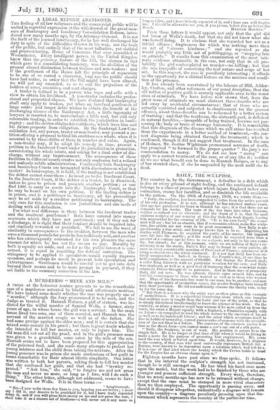A MURDERESS "MEEK AND MILD!'
A TRIAL at the Leicester Assizes presents to us the remarkable case of a murderess actuated by kindly and affectionate motives. We have indeed some doubt whether the case was properly one of "murder," although the Jury pronounced it to be such, and the Judge so treated it. Hannah Holmes, a girl of sixteen, was in- dicted for the wilful murder of Samuel Wells, a farmer, sixty years of age, in whose house the girl was a servant. In the same house lived two sons, one of them married, and Hannah was the servant of the married couple as well as of the father. She had some grudge against the older man ; and it is certain that she mixed some arsenic in his gruel ; but there is great doubt whether she intended to kill her master, or only to injure him. The old man did not eat all the gruel, and in the girl's presence some was given to a grandchild, some eaten by the wife of the son. Hannah seems not to have been prepared for this appropriation of the poisoned food, and she made many attempts to protect her young mistress and the child from taking the mixture. After the young poisoner was in prison she made confessions of her guilt in terms remarkable for their almost idiotic simplicity. One letter was written to both her parents, asking them to tell her master that she confessed her guilt, and that she had " trewley re- pented." "Ask him," she said, "to forgive me and not press the ease and never no more, so long as I live, will I do such a thing." The other letter, although not addressed, seems to have been designed for Wells. It is in these terms :—
"Loughborough.
" Sir—I now write these few lines to you, hopeing you are better ; i must say i did it, and deserve to be punished for it, but i have truly repented doing it, and if you will pleas have mercy on me and not press the case, i shall take it as a sincere act of kindness—i will never act it any more as
long as i live, and i have bitterly repented of it, and i hope you will forgive me. I should be allowed to see you, if you please, before you go before the Bench. HANNAH HOLMES."
From these letters it would appear, not only that the girl did not know of Wells's death, but that she did not know what she was herself doing. It is obvious that she regarded her act as a trivial offence ; forgiveness for which was nothing more than an act of "sincere kindness ; " and she repented as she would probably any little act of pettifogging, or "stopping late on ,errands." It results from this examination of the most inti- mate evidence attainable in the case, not only that in all pro- bability the girl contemplated no murder—no killing ; but that she was incapable of conceiving the real nature and scope of her act. In this respect, the case is peculiarly interesting ; it affords us the opportunity for a clinical lecture on the motives and condi- tion of the prisoner.
It has already been ascertained by the labours of Hill, Adder- ley, Crofton, and other reformers of our penal discipline, that the old notion of positive guilt is scarcely applicable even to the worst class of criminals. We have before now shown that, from the great mass of criminals we must abstract three-fourths who are led away by accidental circumstances ; that of those who are actually convicted and subjected to chastisement for the gravest offences, about three-fourths can be redeemed by a better system of training ; and that the residuum, the sixteenth part, is deficient in natural faculties,—incapable of being trained, because not pos- sessing the body or brain of average humanity. It is remarkable that this diagnosis of the disease which we call crime has resulted from the experiments in a better method of troatment,—the cor- rect diagnosis being obtained through the treatment ; which is confirmed, though it did not suggest that treatment. In the case of Holmes, Mr. Justice Wightman pronounced sentence of death, but promised " to forward to the proper quarter" the jury's re- commendation to mercy. We do not see how " mercy" can apply to a correct treatment of the case, or of any like it ; neither do we see what benefit can be done to Hannah Holmes, or to any of her stunted class, if she be suspended by the neck until she be dead.


























 Previous page
Previous page